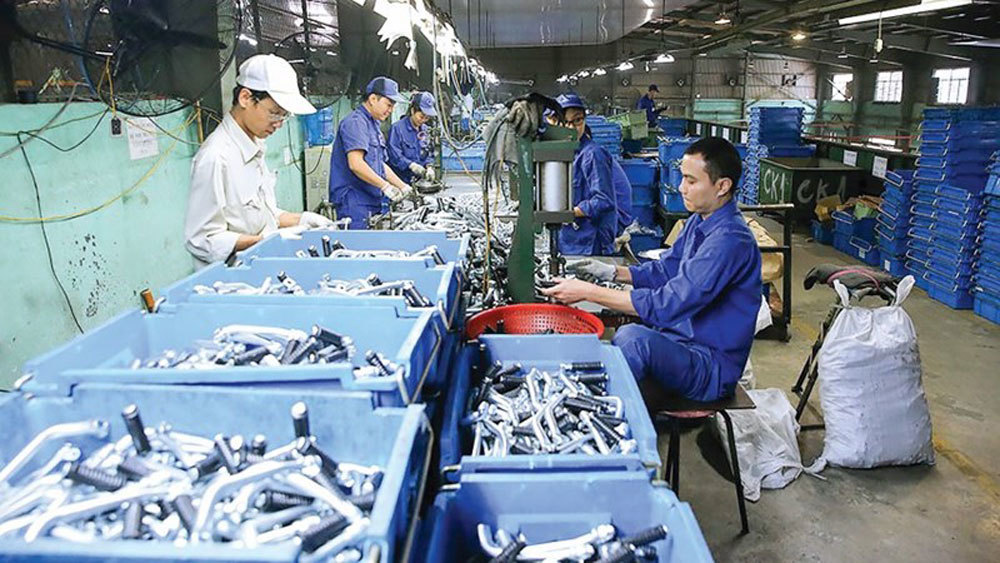The Covid-19 pandemic that has lasted for nearly two years has had a seriously negative impact on Vietnam’s socio-economic development. Small and medium-sized enterprises (SMEs), which account for up to 98% of the total number of businesses in the country, are considered the most affected.
Long-lasting consequences
 |
|
Small and medium-sized enterprises, which account for up to 98% of the total number of businesses in the country, are considered the most affected. |
According to the General Statistics Office of Vietnam, from January to August 2021, more than 85,500 businesses stopped operation or were dissolved due to the impact of the Covid-19 pandemic, and most of them were SMEs.
A survey conducted in mid-August 2021 by the government’s Research Board for Private Economic Development of 21,517 businesses and business households showed that 69% (equivalent to 14,890 enterprises) had to suspend production and business due to the epidemic. Most of them were small and micro businesses.
In June 2021, the HCM City Association of Small and Medium Enterprises surveyed nearly 1,500 member enterprises and found out that up to 57% of them operated in moderation; 2.61% temporarily suspended operations or waited for dissolvement; and only 1.41% operated well during the epidemic.
To Hoai Nam, Vice Chairman of the Vietnam Association of Small and Medium Enterprises, said that by this fourth Covid-19 outbreak, the revenue of many small and medium-sized enterprises had decreased by more than 50%, resulting in heavy consequences.
The difficulties facing small and medium enterprises were temporary suspension during the time of social distancing; failure to sell their products; lack of materials and high prices for materials; inability to access bank capital; and additional expenditures for anti-epidemic measures.
Many small and medium-sized businesses are facing difficulties because their revenue has dropped sharply or have not earned any revenue for a long time but they have had to pay monthly expenses, exhausting capital source.
"I am the owner of two businesses, including a media service and a wine trading firm. The wine business has almost been suspended because there are no customers, but every month I still have to pay several tens of millions of VND for electricity bills and shop rental. My media company is also struggling to survive as we do not have new customers while old customers have ceased most of their contracts. The bank loans are hanging over my head,” Nguyen Dang Vinh, a businessman in Hanoi told VietNamNet.
Nguyen Le Hoang, who runs a small company producing canvas and mobile eaves in District 10, Ho Chi Minh City, lamented that his business had been in a very difficult situation owing to the pandemic. The minimum operating cost to pay 50% of salary for employees and office rental is estimated at 40 million VND per month.
"Over the past 100 days, I've been really stuck. My company has been suspended for three months, but I have had to pay for it, including banking principal and interest. If this continues, I will go bankrupt," he said.
Vietnamese businesses need financial support
 |
|
Small and medium-sized enterprises are in dire need of financial resources to maintain and restore operations.
|
The Research Board for Private Economic Development’s survey shows that if money is the life source of enterprises, then most Vietnamese small and medium-sized enterprises are lacking "blood".
According to this survey, more than 40% of enterprises said that they had enough money to maintain operations for less than one month. Household businesses were the most vulnerable, with 45% having cash flow for operation in less than one month. For limited and joint stock companies, the rate was 39.5%.
Thus, without the State’s support, then a large number of enterprises face the risk of dissolvency.
According to financial experts, in the period of January-August of 2021, about 10,000 businesses ceased operation or dissolved each month on average. From now until the year’s end, if the epidemic is controlled and the economy recovers, the number of businesses that stop operating or dissolve is estimated at 100,000, or up to about 150,000.
Small and medium-sized enterprises are in dire need of financial resources to maintain and restore operations. However, getting loans from banks is very difficult for them.
Banks said that most small and medium-sized enterprises have financial and accounting information that does not ensure transparency, making it difficult for banks to appraise loan documents. In the context of the Covid-19 epidemic, many small businesses no longer have collateral to take out a new loan and do not have a guaranteed income to repay the loan.
The Country Private Sector Diagnostic (CPSD), published recently by the International Finance Corporation (IFC) and the World Bank (WB), recommended that the private sector played a leading role in the outstanding development of Vietnam in the past time. In the current epidemic wave, Vietnam must further promote a dynamic, diverse and innovative private sector for the post-Covid recovery period.
Resolution No.105/NQ-CP dated September 9, 2021 of the Vietnamese Government on supporting businesses, cooperatives and business households in the context of Covid-19 pandemic also requires urgent support in terms of administrative institutions and credit - finance, cutting costs, removing cash flow difficulties for enterprises, cooperatives, and business households, and helping the majority of enterprises that have temporarily ceased business resume operation.
Tran Thuy

Businesses need to be given more autonomy in new normal
A survey conducted by Vietnam Chamber of Commerce and Industry (VCCI) in September of nearly 3,000 businesses found that 93.9 percent have been affected by the pandemic at a ‘completely negative’ or ‘mostly negative’ level.